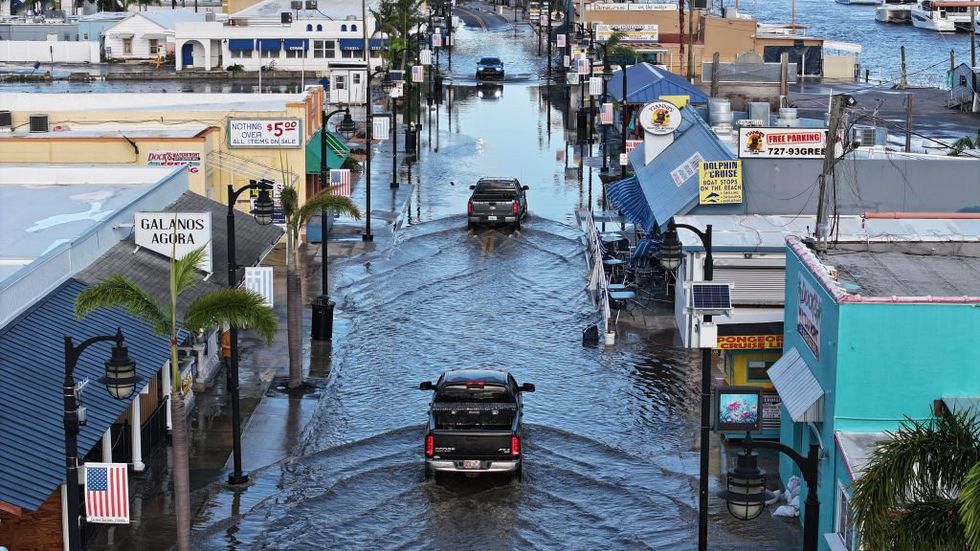NOAA previously predicted 'above-normal hurricane activity' this year: '17 to 25 named storms'
The National Oceanic and Atmospheric Administration, a government agency, previously predicted in May that this year, the country would experience "above-normal hurricane activity in the Atlantic basin."The agency's National Weather Service forecasters at the Climate Prediction Center reported earlier this year that the 2024 hurricane season, stretching from June 1 through November 30, had an 85% chance of an above-normal season, only a 10% chance of near-normal, and just a 5% chance of below-normal.'Extremely dangerous, life-threatening storm.'NOAA estimated that this year's hurricane season would likely see "17 to 25 named storms" with wind gusts of 39 mph or more. Of those storms, it predicted that eight to 13 of them would become hurricanes with winds of 74 mph or higher. It also forecasted that there would be four to seven "major hurricanes" that would reach Category 3, 4, or 5, with winds of 111 mph or more."Forecasters have a 70% confidence in these ranges," NOAA reported.The agency claimed that several factors contributed to the above-normal season, including warm temperatures and fewer trade winds and less wind shear in the Atlantic Ocean, as well as La Nina conditions in the Pacific.FEMA Deputy Administrator Erik A. Hooks commented on the NOAA report at the time, stating, "Severe weather and emergencies can happen at any moment, which is why individuals and communities need to be prepared today.""Already, we are seeing storms move across the country that can bring additional hazards like tornadoes, flooding, and hail," Hooks continued. "Taking a proactive approach to our increasingly challenging climate landscape today can make a difference in how people can recover tomorrow."Despite the federal government and, more specifically, FEMA having knowledge of the above-normal prediction at least since May, the Biden-Harris administration seemed ill-prepared to handle the devastation of Hurricane Helene. Many reports from those on the ground who volunteered to help stranded individuals in need claimed that FEMA's response was slow at best.In the wake of Helene, Florida residents are once again bracing themselves for the oncoming Hurricane Milton that is set to barrel through the peninsula this week. The storm is expected to reach landfall as a Category 3. Over 1 million Floridians are under evacuation orders.The United States Department of Labor posted on X Tuesday afternoon, "[Milton] is an extremely dangerous, life-threatening storm. LEAVE NOW if you are in an evacuation zone; there will not be time to leave on Wednesday."Like Blaze News? Bypass the censors, sign up for our newsletters, and get stories like this direct to your inbox. Sign up here!


The National Oceanic and Atmospheric Administration, a government agency, previously predicted in May that this year, the country would experience "above-normal hurricane activity in the Atlantic basin."
The agency's National Weather Service forecasters at the Climate Prediction Center reported earlier this year that the 2024 hurricane season, stretching from June 1 through November 30, had an 85% chance of an above-normal season, only a 10% chance of near-normal, and just a 5% chance of below-normal.
'Extremely dangerous, life-threatening storm.'
NOAA estimated that this year's hurricane season would likely see "17 to 25 named storms" with wind gusts of 39 mph or more. Of those storms, it predicted that eight to 13 of them would become hurricanes with winds of 74 mph or higher. It also forecasted that there would be four to seven "major hurricanes" that would reach Category 3, 4, or 5, with winds of 111 mph or more.
"Forecasters have a 70% confidence in these ranges," NOAA reported.
The agency claimed that several factors contributed to the above-normal season, including warm temperatures and fewer trade winds and less wind shear in the Atlantic Ocean, as well as La Nina conditions in the Pacific.
FEMA Deputy Administrator Erik A. Hooks commented on the NOAA report at the time, stating, "Severe weather and emergencies can happen at any moment, which is why individuals and communities need to be prepared today."
"Already, we are seeing storms move across the country that can bring additional hazards like tornadoes, flooding, and hail," Hooks continued. "Taking a proactive approach to our increasingly challenging climate landscape today can make a difference in how people can recover tomorrow."
Despite the federal government and, more specifically, FEMA having knowledge of the above-normal prediction at least since May, the Biden-Harris administration seemed ill-prepared to handle the devastation of Hurricane Helene. Many reports from those on the ground who volunteered to help stranded individuals in need claimed that FEMA's response was slow at best.
In the wake of Helene, Florida residents are once again bracing themselves for the oncoming Hurricane Milton that is set to barrel through the peninsula this week. The storm is expected to reach landfall as a Category 3. Over 1 million Floridians are under evacuation orders.
The United States Department of Labor posted on X Tuesday afternoon, "[Milton] is an extremely dangerous, life-threatening storm. LEAVE NOW if you are in an evacuation zone; there will not be time to leave on Wednesday."
Like Blaze News? Bypass the censors, sign up for our newsletters, and get stories like this direct to your inbox. Sign up here!
Originally Published at Daily Wire, World Net Daily, or The Blaze
What's Your Reaction?
































































































